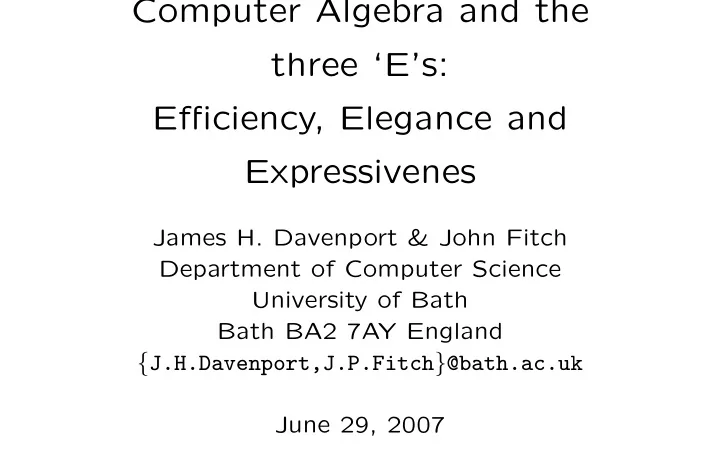

Computer Algebra and the three ‘E’s: Efficiency, Elegance and Expressivenes James H. Davenport & John Fitch Department of Computer Science University of Bath Bath BA2 7AY England { J.H.Davenport,J.P.Fitch } @bath.ac.uk June 29, 2007
We all want (as users) or claim to provide (as designers) the three ‘E’s • Elegance • Expressiveness • Efficiency 1
Elegance (of input) � b 2 − 4 ac − b + (1) 2 a \frac{-b+\sqrt{b^2-4ac}}{2a} (-b+SQRT(b^2-4*a*c))/(2*a) (/ (+ (- b) (SQRT (- (^ b 2) (* 4 a c)))) (* 2 a)) (divide (plus (minus b) (sqrt (minus (power b 2) (times 4 a c))) (times 2 a)) 2
But is this a real issue? 1. There is so much going on (MathUI) that the visual should cease to be a problem. • “I don’t mind editing XML as long as I don’t have to look at it”. 2. It is nice to have automatic n -arisation, es- pecially with lists: ’gcd’/[content(p,x) for p in l]> is nice. 3. Especially if the system can do ’early abort’ on finding 1, as in Axiom. • Rest becomes ‘expressiveness’. 3
Elegance (of output) This is a real issue. Who can wade through the 100s of pages our system can produce at the drop of a hat? Users This is a system issue, not a language issue. Programmers Do need proper support in the language to support debugging, with I/O in their types, not the macine types in which they are implemented. Interpreted languages tend to provide this, compiled ones not (but Axiom did!). 4
Expressiveness Of course, we really want � b 2 − 4 ac − b ± . (2) 2 a • Easy — just extend the operators. • Often appropriate: v / || v || . • But not the panacea it seems. 5
� 1 3 � 12 b 3 + 81 c 2 − 108 c + 12 6 2 b − , � � 3 12 b 3 + 81 c 2 − 108 c + 12 is apparently 36-valued. Even � 3 � λx. 1 6 x − 2 b � � 12 b 3 + 81 c 2 − 108 c + 12 x is apparently six-valued. 6
Expressiveness needs types (JHD only; JPff disagrees) • If the elements of my matrix come from a commutative ring, I want you to multiply the matrices . . . • and calculate the determinant. • What do you mean: “division by a zero divisor”! No known type system is powerful enough! 7
Efficiency: what is special about us? • There’s no credit for being the second to do a computation. * But the same is true of the rest of compu- tational science. • My data are so large. * Bet Google’s eigenvalue problem is bigger than yours! 8
The dynamic range Gaussian elimination in sparse matrices • Dodgson/Bareiss fraction-free • With special sparsity hacks • The entries might be very large • or they might be integers, mostly very small At one extreme, I’ll tolerate any overhead, at the other I want byte-packing for most of the entries. 9
How does this manifest itself? • Early Maple’s ’polynomial gcd by evalua- tion’. * Integers are fast, Z [ x ] / ( p ) isn’t. • Code bloat. • Axiom’s ’special case compilation’. • Singular’s hack for exponent packing. * But they’re safe! 10
Questions to think about (almost all related!) • Where is the kernel boundary? • How will I get efficiency when the objects are small/fast? • Are my efficiency hacks safe? * If not, should I be in this game at all? • Are there efficiency hacks that could be safe/semi-safe? 11
• Now, where was that swamp I was menat to drain? * (with thanks to Fred Brooks)
Recommend
More recommend